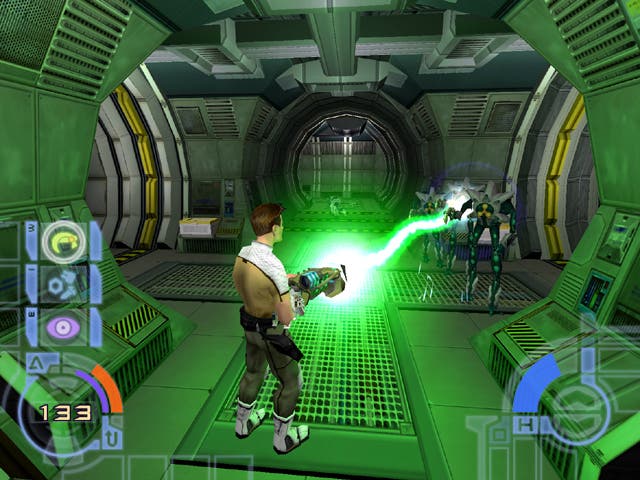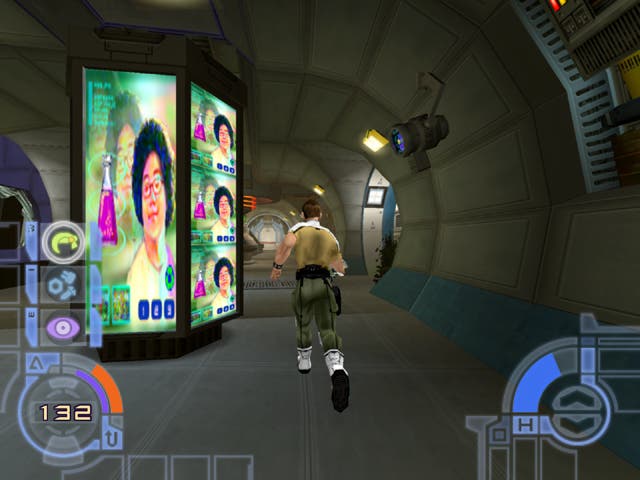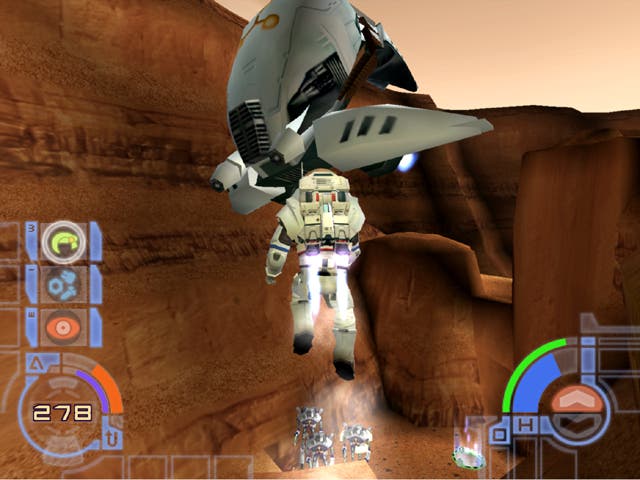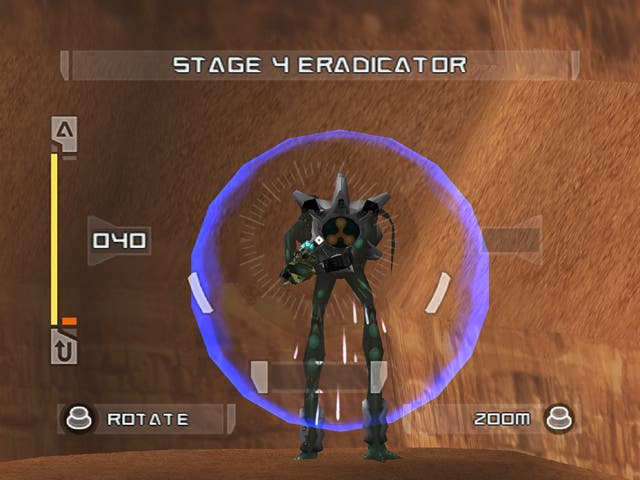RTX Red Rock
The first original LucasArts title for nearly five years - but is it any good?
It's hard to believe, but since Grim Fandango's celebrated release back in the young and innocent days of 1998, all we've had from the once revered LucasArts is a succession of sequels, and Star Wars Episode I and II spin-offs. Nope, not one original game - until now.
As much as we like Star Wars, it's arguable that this tempting cash cow property effectively strangled LucasArts ability to act as a stable for groundbreaking innovation after 15 years of unmatched consistency. Whether it was management errors or complacency that brought about the startling creative decline is open to debate, but changes were made three years ago when Brit Simon Jeffrey was ushered in as president.
A new hope

He promised a new era, and a return to doing what it does best - creating new original properties, reviving past classics and hiring top developers to make it happen. But some internal development remained on board, and RTX Red Rock is the first original game to roll off the Lucas production line since this new era was introduced.
With Hal Barwood of Fate Of Atlantis and The Dig fame among the production credits, our interest was piqued. Was this the return to the glory days we were promised? A mature blend of subtle narrative, gripping adventure and sweaty space action that will inject new ideas into a tired genre? Well, not quite, but with review code restrictions (LucasArts rarely makes review code available, before you ask), we're already a good three weeks late with this assessment, and it appears that RTX Red Rock is already history, having failed to even make the PS2 Full Price Top 20 since its release at the beginning of the month. And that's in a quiet month.
But with sod all being released of any note this summer, that doesn't mean you shouldn't give it some serious consideration. Retailers may be unimpressed (hey, where's the license?), the critics may be underwhelmed (hey, where's the free beer?), but any punters out there with a passion for all things (old school) LucasArts will be wondering how a potentially blockbusting title with a rich development heritage behind it could have disappeared from view so ingloriously. So much for originality; when's the next Star Wars game?
Say goodbye to the past

As you'd expect in this ultra cautious climate of brand obsessed multinationals, LucasArts has steadfastly shied away from reviving its lineage of classic adventure games, deeming the genre moribund and uncommercial. Instead, the Californians headed for the safe haven of the action-adventure genre, with a splash of concerted character development and interspersed narrative. Better than nothing, we suppose.
Purists such as your humble reviewer will automatically rue the facts that - yet again - the opportunity to provide the game equivalent of an interactive novel has been passed up. What do you want? An immersive, intelligent, narrative/puzzle-based title that you can test your brain with and wrap yourself up in for weeks on end, or Tomb Raider in space?
Tomb Raider in space is hardly fair, but once we'd stepped off our battered soap box and let our nostalgic hissy fit subside, it seems there is plenty of the old LucasArts magic lurking within RTX Red Rock if you treat it on its own merits.
If there's one thing that you can generally rely on with LucasArts games it's the ability to spin a compelling narrative and back it up with a decent voice cast. RTX never lets us down here, and right from the off the tale of Radical Tactics Expert (hence RTX) Eugene Zeno Wheeler's (or E-Z to his mates) mission to Mars in the year 2113 is one that draws you in and becomes more interesting as the game progresses. As you'd expect, he's a bit of a hard bastard, and even has a special eye and prosthetic Terminator arm to prove it.
Life on Mars?

The tale spans ten increasingly absorbing chapters across various areas of Mars, including the distressed research station, a diamond mine and a township, before climaxing in a crater, and Mr Barwood's presence is felt throughout with an air of mystery and otherworldliness last seen in the 1995 classic The Dig.
In this crucial storytelling aspect, hardened adventurers won't be disappointed, although the removal of text trees and the need to investigate/interrogate anyone means that you're nothing more than a passive observer to the tale played out before you in the manner of just about every action adventure ever. The trade off, obviously, is the chance to participate directly in the action, and LucasArts has tried hard to create a game that will somehow keep both sets of gamers happy.
Despite is obvious best intentions, the result is a rather awkward hybrid that occasionally delivers, but regularly irritates and conspires against even the most dedicated gamer. On a basic level, RTX comes across as a bog standard third person action adventure, with plenty of shooting, jumping, climbing and object collection. Frankly, LucasArts has the creative muscle and experience to create something more ambitious than that.
Ambition thwarted

Most core aspects of the game, however, feel merely functional rather than pushing any boundaries. The most obvious example is the visuals, which at first glance have a style and panache that make it stand out from the predictable herd. The environments and character models are often highly impressive, with some excellent design touches and a flair that convinces you that the ambition was there. The cut-scenes are top notch too, with a degree of character we've missed since the company's mid 90s heyday. A shame, then, that the art guys were hampered by a sluggish engine that regularly comes to a complete halt during key moments. At best it's chuggy, and in this cutthroat arena it's amazing LucasArts even allowed it out of the door in such an unpolished state. Worse still, E-Z regularly clips through the scenery, the camera system rarely feels as convincing as it could, and the jumping/platform sections are plain tedious.
Then there's the controls. In the main you'll be comfortable with the fairly standard system on offer, with the left stick handling movement and the right assigned to camera duties. Likewise, the action buttons are all sensibly assigned to the symbol buttons, but it's the inventory system that really conspires to make a game of RTX a fiddly and unwieldy experience. Either you hit select and cycle through a multitude of weapons, special abilities or items, or hit the D-pad to cycle through the three main categories. At any one time you'll have one of each selected by default, but the game requires you to switch task or item so much, you'll find yourself constantly having to access it on the most inconvenient occasions. You wonder if at some stage of development this whole game was shoehorned into the confines of a joypad without really considering how much of a pain in the arse it becomes.
And for all its narrative skill, RTX occasionally leaves the player up shit creek without a paddle, mainly thanks to a fairly fundamental omission. Near the start of the game, you're presented with the first opportunity to use Iris, who is basically your accomplice throughout the game. Iris isn't a real person, despite her insistence on looking like Barbie. She is, in fact, just a circuit board, who you can handily plug into all manner of machinery and take over control yourself. All very logical, except the game fails to explain that you can unplug our Iris from whatever device you've plugged her into, whenever you like. It sounds simple, but we were stuck for literally hours trying to establish how to get our robot dog up a ladder. D'oh indeed.
Frustration reigns
And that's not the only frustrating area. There are, of course, a procession of enemies, all of which you have to kill, lest they terminate you. Problem is, the game's so-called auto-targeting facility is almost completely useless, and seems to rely on the player being directly in front of his target, nullifying the point of auto-targeting completely. It doesn't ruin the game, but it certainly makes it a whole lot less fun. What does ruin the game are the occasional fascist boss monsters, which in one hair-tearing case were impermeable to laser cannon fire that can blow holes in walls, and yet could fire unavoidable homing missiles that can breach the same masonry.
RTX tries hard to appeal to a broad audience, but feels so lacking in polish, you wonder how such a prestigious company could allow it to be released in such a state. Rather like Angel Of Darkness, if you're prepared to stick with it and cast off your frustrations and the game's limitations, you'll slowly begin to enjoy what is actually a rather solid enjoyable, well paced adventure game. It's just a shame LucasArts didn't stick to what it does best and steer away from bolting on ill-conceived, often shoddy action elements that detract from everything that's good about the game. It says a lot about the state of the summer release schedule when we find ourselves recommending such a flawed gem. Check it out if you can find it cheap; patience has its own rewards.








